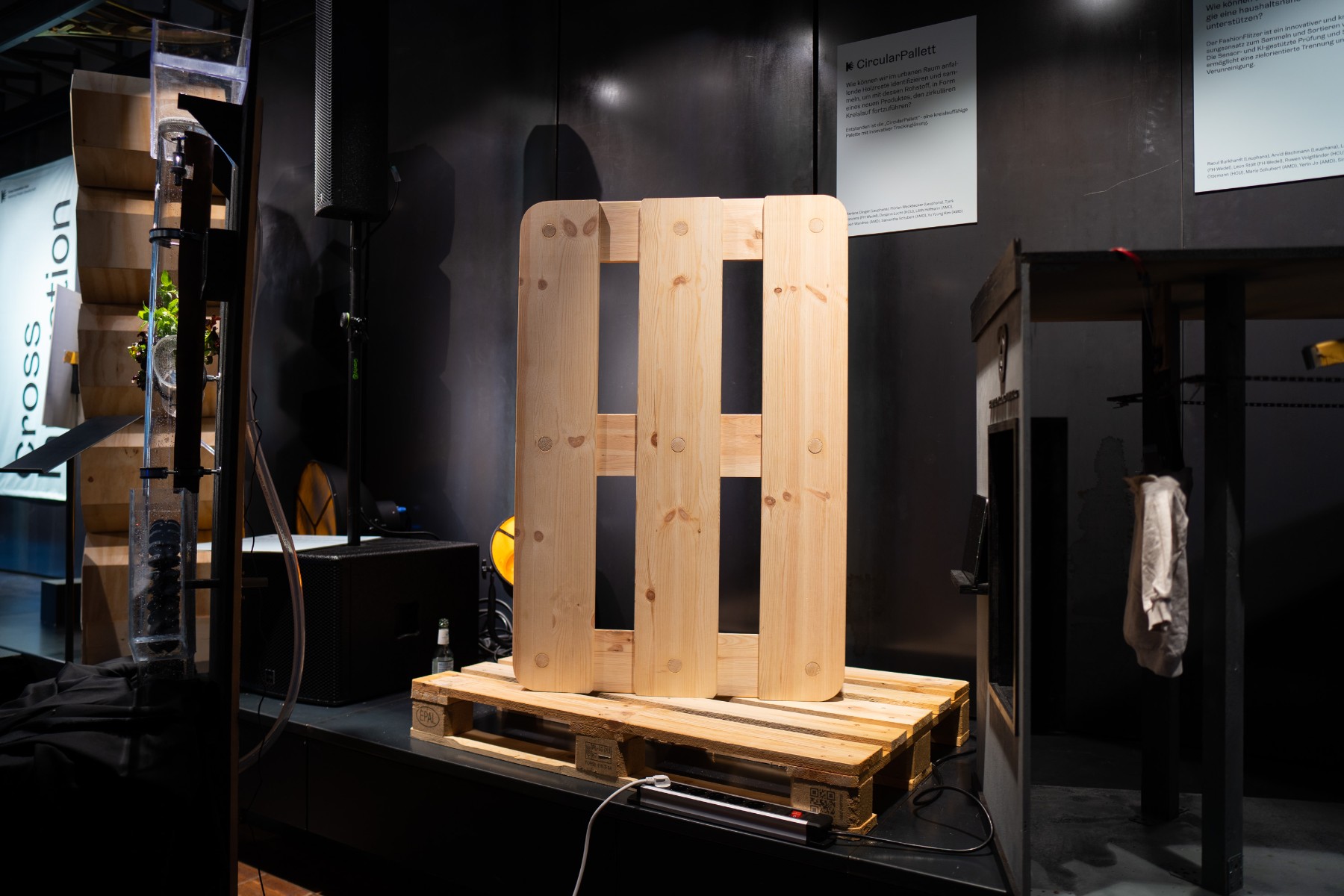PALETTEN-SERVICE Hamburg: Making logistics more sustainable
In the Cross Innovation Class interdisciplinary student teams developed circular products.
In the Cross Innovation Class interdisciplinary student teams developed circular products.

In der Cross Innovation Class entwickelten interdisziplinäre Studierenden-Teams gemeinsam mit Unternehmen Lösungen für Circular Cities.
Die klassische Holzpalette spielt in nahezu allen Lieferketten eine wichtige Rolle. Ob auf Containerschiffen, bei der LKW-Logistik oder bei der Lagerung von Gütern – tagtäglich kommen weltweit Millionen an Paletten zum Einsatz. Auch wenn der Rohstoff Holz nachwachsend und ökologisch ist, gibt es bei der Produktion einzelner Komponenten noch viel Optimierungsbedarf. Vor allem die Verarbeitung von schadstoffreichem Leim sowie Stahlnägeln mit hohem CO2-Footprint wirken sich negativ auf die Öko-Bilanz der Palette aus. Der Fokus der Fragestellung für das Studierendenteam lag somit darauf, die Verarbeitung von Holzpaletten neu zu denken und deren kreislauffähige Aufbereitung zu optimieren.
Durch die hohe Perspektivvielfalt der Studierenden aus den Bereichen IT, Umweltwissenschaften, Stadtplanung und Design entstand in dem Prozess eine umfassendes Problemverständnis. Besonders interessant für das Unternehmen war dabei das gezielte Hinterfragen verschiedener Prozesse, die sich im Arbeitsalltag selbst nicht ergeben haben.
Entstanden ist die „CircularPalett“ – eine Holzpalette, die wirklich kreislauffähig ist. Für den herkömmlichen Kleber, der oft Schadstoffe wie Formaldehyd enthält, wurde ein ökologisch verträglicher Ersatz gefunden. Auch Stahlnägel, die unter großem Energieaufwand produziert werden, braucht es nicht mehr, denn die Bretter und Klötze werden von Holzstiften in einem Stecksystem zusammengehalten. Das ganze Produkt ist somit sortenrein und lässt sich am Ende seiner Lebenszeit besonders effektiv recyceln.
Team: Tjark Dondera ,Florian Weckbecker, Marlena Dinger, Despina Locht, Lilith Arwen Hofmann, Noah Wandres, Samantha Schubert, Yu Joung Kim
In der Cross Innovation Class arbeiten Studierende aus drei bis sechs verschiedenen Hochschulen in interdisziplinären Teams an den Herausforderungen der Projektpartner.
Die Cross Innovation Class 2023 fand im Sommersemester 2023 zum Thema Circular Cities statt.
Seit über 50 Jahren ist PALETTEN-SERVICE Hamburg Pionier der Palettenreparatur, des Palettenhandels und der Logistik. Auch zukünftig will das Unternehmen Vorreiter sowohl in diesen Bereichen als auch der Palettenproduktion und des Palettenmanagements sein. Als einer der ersten Palettenhersteller in Deutschland ist Paletten Service Hamburg von ClimatePartner als klimaneutral zertifiziert worden. Ab 2023 sind alle Paletten ausschließlich klimaneutral erhältlich.